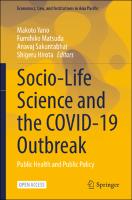Socio-Life Science and the COVID-19 Outbreak
Public Health and Public Policy
Contributor(s)
Yano, Makoto (editor)
Matsuda, Fumihiko (editor)
Sakuntabhai, Anavaj (editor)
Hirota, Shigeru (editor)
Language
EnglishAbstract
This open access book presents the first step towards building socio-life science, a field of science investigating humans in such a way that both social and life-scientific factors are integrated. Because humans are both living and social creatures, a human action can never be understood fully without knowing both the biological traits of a person and the social scientific environments in which he exists. With this consideration, the editors of this book have initiated a research project promoting a deeper and more integrated understanding of human behavior and human health. This book aims to show what can, and could be, achieved through our interdisciplinary project. One important product is the newly formed three-party collaboration between Pasteur Institut, Kyoto University, and the Research Institute of Economy, Trade and Industry. Covering many different fields, including medicine, epidemiology, anthropology, economics, sociology, demography, geography, and policy, researchers in these institutes, and many others, present their studies on the COVID-19 pandemic. Although based on different methodologies, the studies show the importance of behavioral change and governmental policy in the fight against a huge pandemic. The book explains the unique genome cohort–panel data that the project builds to study social and life scientific aspects of humans.
Keywords
Socio-life Science; COVID-19; Antibody Test; Social Capital; Cohort/panel Data; Genoeconomics; Open AccessDOI
10.1007/978-981-16-5727-6ISBN
9789811657276, 9789811657276Publisher
Springer NaturePublisher website
https://www.springernature.com/gp/products/booksPublication date and place
Bern, 2022Imprint
Springer SingaporeSeries
Economics, Law, and Institutions in Asia Pacific,Classification
Public administration
Public health and preventive medicine


 Download
Download Web Shop
Web Shop